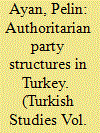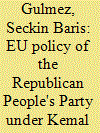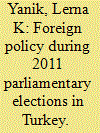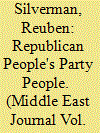|
|
|
Sort Order |
|
|
|
Items / Page
|
|
|
|
|
|
|
| Srl | Item |
| 1 |
ID:
097539


|
|
|
| 2 |
ID:
120760


|
|
|
|
|
| Publication |
2013.
|
| Summary/Abstract |
This article scrutinizes the determinants of the European Union (EU) policy of the Republican People's Party (CHP), the main opposition party in Turkey under the leadership of Kiliçdaroglu. Critically discussing the role of party ideology concerning attitudes toward EU accession, the article examines whether the CHP's ideology changed after Kiliçdaroglu and if so, how this ideological shift affected the party's euroskeptic stance. The article overall argues that the leadership change enabled the party to withdraw its nationalistic stance and embrace a social democratic rhetoric. However, the article contends that such transformation had little effect on its euroskepticism due to the persisting endogenous (the Justice and Development Party's authoritarianism) and exogenous factors (the EU's additional conditionality) that constrain the new CHP's EU-enthusiasm.
|
|
|
|
|
|
|
|
|
|
|
|
|
|
|
|
| 3 |
ID:
114240


|
|
|
|
|
| Publication |
2012.
|
| Summary/Abstract |
This article focuses on the foreign policy sections of 2011 election manifestos of the Adalet ve Kalkinma Partisi (Justice and Development Party) (AKP), the Cumhuriyet Halk Partisi (Republican People's Party) (CHP), the Milliyetçi Hareket Partisi (Nationalist Movement Party) MHP, and the Emek, Demokrasi ve Özgürlük Bloku (Labor, Democracy and Freedom Bloc) (EDÖB) the pre-election Bars ve Demokrasi Partisi (Peace and Democracy Party) (BDP). Foreign policy is both an issue and a non-issue for Turkish electorate because although foreign policy issues have almost no impact on voters choices, the parties still continue to devote space to foreign policy performances, promises, and projections in their election manifestos. The analysis of 2011 election manifestos reveals that the AKP primarily envisions a Turkey with more commonalities with the East than with the West, but yet ranked Turkey's relations with Europe and the West higher; for the MHP while Turkey's commonality with the East was defined in terms of common history and culture, the West was portrayed to have commonness only in terms of values; the CHP equated European values with universalism and prioritized Turkey's ties with Europe; finally, the EDÖB manifesto was an anti-thesis of all manifestos where foreign policy was instrumental for the ideological goals of the bloc and subsequently of the BDP.
|
|
|
|
|
|
|
|
|
|
|
|
|
|
|
|
| 4 |
ID:
151859


|
|
|
|
|
| Summary/Abstract |
When Recep Tayyip Erdoğan, as the Prime Minister of the Turkish Republic, declared his government's intention to raise a ‘religious generation’, his proposition drew harsh criticisms from Turkey's secularists, who argued that doing so would clearly challenge the secular nature of the Turkish state. Yet it may come as a surprise to many that it was not a conservative party with Islamist leanings that first experimented with the idea of relying on religious education as an antidote to the perceived moral decadence of the society. Rather, it was the secularist party, the Republican People's Party, which attempted to use religious instruction for the same purpose during the heyday of Kemalism in the 1940s. Against this backdrop, providing an analysis of how the Republican People's Party had come to the point of offering religious education to school children and how it justified this policy can shed light on today's debate on secularism and the secular character of the Turkish state.
|
|
|
|
|
|
|
|
|
|
|
|
|
|
|
|
| 5 |
ID:
120763


|
|
|
|
|
| Publication |
2013.
|
| Summary/Abstract |
In the period from 1923 to 1946, the new regime was consolidated through a series of radical secularizing reforms. In order to make these reforms acceptable to a wider public, the new Republic tried to build a secular Turkish identity that does not include Islam. High school history textbooks were prepared to this end in 1931. It has generally been argued that the transition to a multi-party regime constituted a break by opening greater space for religion in society. However, the Kemalist Project to develop a secular Turkish identity without Islam ended in 1942, i.e. during the single-party rule of the Republican People's Party (RPP). The reasons behind this change show that the RPP was a more heterogeneous party in terms of the views of its policy-makers on religion.
|
|
|
|
|
|
|
|
|
|
|
|
|
|
|
|
| 6 |
ID:
165786


|
|
|
|
|
| Summary/Abstract |
Though it was the Democrat Party that governed Turkey from 1950 to 1960, and whose successes and excesses shaped the conditions of democratization, the previously ruling Republican People's Party played a crucial role as well. Drawing on newspapers, memoirs, and parliamentary debates, this article considers how the party's leaders and its young cohort of future leaders reacted to defeat, redefined themselves as members of the opposition, and contributed to a polarized political culture that persists today.
|
|
|
|
|
|
|
|
|
|
|
|
|
|
|
|
|
|
|
|
|